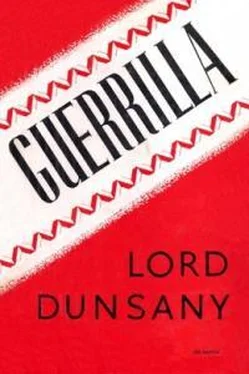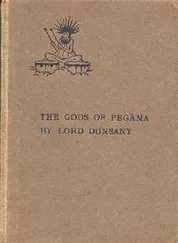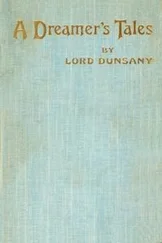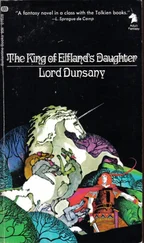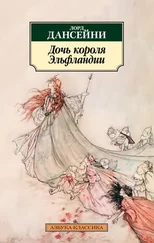Лорд Дансейни - Guerrilla
Здесь есть возможность читать онлайн «Лорд Дансейни - Guerrilla» весь текст электронной книги совершенно бесплатно (целиком полную версию без сокращений). В некоторых случаях можно слушать аудио, скачать через торрент в формате fb2 и присутствует краткое содержание. Год выпуска: 2015, Издательство: epubBooks Classics, Жанр: Прочие приключения, на английском языке. Описание произведения, (предисловие) а так же отзывы посетителей доступны на портале библиотеки ЛибКат.
- Название:Guerrilla
- Автор:
- Издательство:epubBooks Classics
- Жанр:
- Год:2015
- ISBN:нет данных
- Рейтинг книги:5 / 5. Голосов: 1
-
Избранное:Добавить в избранное
- Отзывы:
-
Ваша оценка:
- 100
- 1
- 2
- 3
- 4
- 5
Guerrilla: краткое содержание, описание и аннотация
Предлагаем к чтению аннотацию, описание, краткое содержание или предисловие (зависит от того, что написал сам автор книги «Guerrilla»). Если вы не нашли необходимую информацию о книге — напишите в комментариях, мы постараемся отыскать её.
Guerrilla — читать онлайн бесплатно полную книгу (весь текст) целиком
Ниже представлен текст книги, разбитый по страницам. Система сохранения места последней прочитанной страницы, позволяет с удобством читать онлайн бесплатно книгу «Guerrilla», без необходимости каждый раз заново искать на чём Вы остановились. Поставьте закладку, и сможете в любой момент перейти на страницу, на которой закончили чтение.
Интервал:
Закладка:
When he was far from the town he sat down and put on his boots, tying them with many knots, for he had cut the laces earlier in the night. He put them on, not so much for protection for his feet on the road, but in case he should have to take to the rough country. The road had no boundaries any longer, and he felt almost perfectly safe now, for any patrol he might meet on the road would never overtake him in the rough country by night. He had only to run a few yards to his left, and the night and the Mountain would take care of him.
So he went on slowly through the night, thinking of Hlaka, and of the victory of The Land, which many doubted and which the Germans had not even considered as a possibility, or as an eventuality worthy of the trouble of any of their speakers to deny, but Srebnitz saw it vividly, and Hlaka up in the Mountain never saw anything else; for Srebnitz victory for The Land was a faith, but Hlaka up in the Mountain with his band of free men saw it all round him as the saints see Paradise. The eastern stars paled and a light came low in the sky and the night seemed to grow colder.
Srebnitz was glad of the second blanket that Sophia had given him, and that he wore like a cloak. He was too young to know that sleeplessness and hunger are two other causes of cold, besides the obvious one of the wind before dawn on a mountain; but a very elementary instinct prompted him to eat food, and he sat down by the road and cut a slice from the ham that Sophia had given him and a slice of bread from a loaf, both with the knife that had killed the sentry. The knife reminded him of his fulfilled dream, the rifle now in his hands, and he raised the rifle to his lips and kissed it.
Dawn as he ate came up coldly and slowly, first in a dead hush, then with the familiar sounds that accompany dawn in Europe, rising up from the far town, the dull and occasional rap of volleys of musketry. Reprisals already, thought Srebnitz. A feeling of horror went through him for a moment. And then he remembered Gregor's words, that all these people were lost already. Today, tomorrow or next day they would die: only The Land would be saved. At a certain altitude above the town Liberty seemed to dwell. Down below in the streets he was a fugitive, a man without a permit, and in his father's house he was one of a conquered race; but just about where he was now something in the feel of the air seemed to tell him there ran the frontier of Liberty. Near here, or further up where Hlaka served her, Liberty was enthroned. Her banners were beginning to show over the Mountain now, as the sun, although not yet risen, caught floating clouds; and larks rose up to sing to her. Her palace roof was over his head, the open sky; its great bastion rose beside him, the wild Mountain. He was going to join her guards. Then the boy's mind, playing with fancies, tried to picture what uniform the guards of Liberty should wear, and fancied them for a moment gorgeous in gold lace, marching into the capital when victory came. And suddenly a glance, straying from dreams, fell on his own clothes, and he realised that the Guards of Liberty were cloaked with a brown blanket, and wore plain clothes, much like his own, with a red sleeve.
VI
The fancies had turned to dreams, and Srebnitz, starting up and seeing broad daylight, realised that it was time for him to go on at once, before any patrol should come out from the town. He flung an end of his blanket over one shoulder and stooped to pick up his rifle on his right side, then sprang to his left, spun around and looked all about him, and found his rifle was gone. If an earthquake had sunk the Mountain into the earth, leaving him on the brink, he could not have felt more aghast. Indeed the Mountain seemed lost to him now. For he could not go to Hlaka without a rifle. But then he could not go back to the town, with blood on his sleeve. What could he do? And after a while another question came to him. Why had the German rifle been taken from him, and he been left alive? A man picknicking in an Indian jungle, and falling asleep, scarcely expects his cup of tea to be drunk by a tiger, and himself to be spared. If the cup of tea was drunk, it was not by a tiger. Who then took his rifle? The sun had not risen when he had fallen asleep. It was death to be out without a permit between sunset and sunrise. And it was death to be in possession of arms. And death to rob the German army of anything. And as for his right sleeve . . . ! Was another man going to join Hlaka with his rifle? It was the thought of that that made him turn up the Mountain, still following the road, instead of going the other way. He would go to Hlaka and complain that he had been robbed.
He hurried up the road for nearly an hour. Then, where the last scraps of wild vegetation grew, before scrub and flowers ended in bare mountain, he saw a few thin sheep grazing, and an old shepherd standing near them, not far from the road, in one of the vast coats that the shepherds of those lands wear, made out of many sheep–skins. The shepherd was tall and still powerful, and was looking at Srebnitz with a fixed look, more like a frown.
Srebnitz shouted "Good morning" to him, but the shepherd neither answered nor changed his expression. So Srebnitz went on, but felt uneasily that from those craggy eyebrows he was being frowned upon still.
After that he saw nobody any more, and in another hour he came, in the bare mountain, to the end of the road amongst rocks as large as cottages, lying below a cliff. Tracks wound up from there, but only tracks, and Srebnitz wondered what Gregor had meant, when he had said that he could go to any part of the Mountain and that he would come on Hlaka. He called with the long clear cry, that they use in that land, calling the name of Gregor. And the only answer was echoes.
His despair stimulated in him a feverish energy, and he hurried by one of the steep foot–tracks still higher upward. A few bits of a heath–like plant, or stunted bush, grew about him: the rest of the slope was a shiny crumbled stone. To his right the Mountain rose into peaks, but above him the sky–line was not far away. This he soon reached, and saw before him a flat circular space, scarcely a hundred yards across, with little steep hills all round it. He went down to it by a small pass between two miniature hills, and walked across it, and found that he had come to the top of that part of the Mountain. He called again, but even the echoes seemed less responsive here.
He looked away over the plains that lay to the north of the Mountain, and, the sun having gone behind a cloud, he saw them all shadowed. All Europe is under a shadow, thought Srebnitz; and, finding Nature matched by his mood, drew dark omens from the sombre guise of the view.
He turned round then and walked back to look at the city below him, on the other side, to the south. As he recrossed the level arena he noticed, this time, in the midst of it a looser patch of sandy soil, a little circle less than a yard across. He went up to look at it and disturbed the loose soil with his foot; as he did so and revealed black cinders beneath, a voice said to him in ordinary conversational tones, "Leave that alone."
He looked up and at first saw no one. Then a young man walked towards him down a rocky slope of the hills that stood round the arena no higher than the houses of a good street. He carried a rifle, and wore a bandolier.
Srebnitz gazed at him in silence, and as he gazed he saw other men come over the rocks all round him. There were about ten of them, men in rough dress like his own; and Srebnitz said to the man that he saw first: "I have come to join Hlaka."
The man walked further towards him before he spoke, and when he spoke he said: "Hlaka does not take everyone."
In desperation then Srebnitz staked his wealth: "I have six loaves of bread," he said, "and a ham and twenty–five cartridges."
Читать дальшеИнтервал:
Закладка:
Похожие книги на «Guerrilla»
Представляем Вашему вниманию похожие книги на «Guerrilla» списком для выбора. Мы отобрали схожую по названию и смыслу литературу в надежде предоставить читателям больше вариантов отыскать новые, интересные, ещё непрочитанные произведения.
Обсуждение, отзывы о книге «Guerrilla» и просто собственные мнения читателей. Оставьте ваши комментарии, напишите, что Вы думаете о произведении, его смысле или главных героях. Укажите что конкретно понравилось, а что нет, и почему Вы так считаете.
